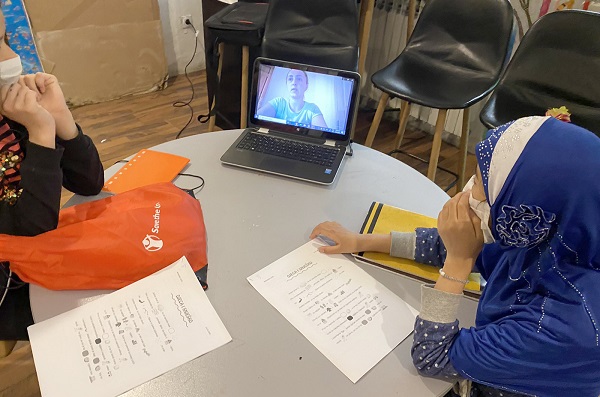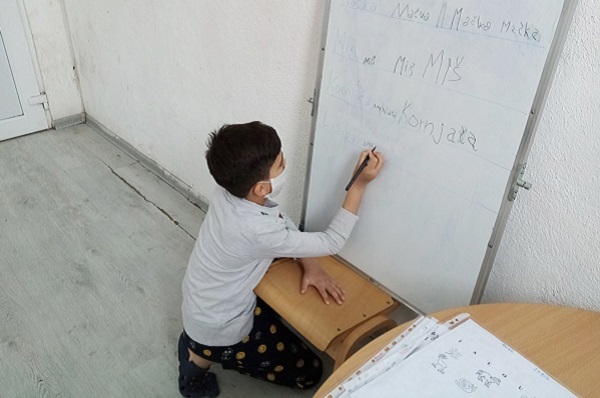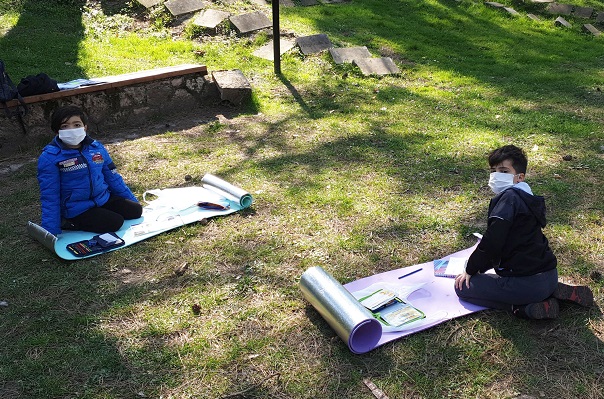 North West Balkans
North West Balkans
Languages
Refugee children continuing their education despite covid-19 outbreak

Children attending classes online. Photo by Save the Children.
“I’m glad that we have this school in the camp,” says 10-years-old Sawa* from Iraq, “I have learned many new things in the past few days. I wish I could go to the ‘big’ school again, but I know that because of the epidemic we shouldn’t go out.”
Sawa* is one of the children who travelled the Western Balkans Route and arrived in Bosnia and Herzegovina, fleeing from conflicts and insecurities in their home countries. Out of 8,000 refugees and migrants present in the country, the majority is situated in the north-west of the country in Una-Sana Canton. In 2018, Save the Children and UNICEF launched education programme for Sawa* and other refugee and migrant children to be able to continue their education. We supported schools to provide preparatory classes for children, engaged cultural mediators and school escorts to facilitate successful integration while also providing school meals, working materials and support with homework and other school tasks. In past two years, over 540 refugee and migrant children benefited from the programme.
However, due to the risk of covid-19 spread in Bosnia and Herzegovina the schools needed to close. This measure specifically affected the lives of refugee and migrant children, since going to school, meeting new friends and spending time outside the refugee camp brought them joy and a sense of normalcy, which they so often missed.
“I miss my school, the schoolteacher and my friends from class”, says 11-years-old Zain* from Iraq, “but I understand that this disease spreads from person to person and that we need to stay away from other people for a while.”

Boy keeping up with Bosnian language classes during covid-19 lockdown. Photo by Save the Children.
Over 50,000 refugees and migrants arrived in BIH since it became a key transit country in the Balkans in 2018. In the past two years, Save the Children, in cooperation with UNICEF, supported over 15,000 children and adults, providing often life-saving protection services for the most vulnerable children, education support and NFI’s, while advocating for the visibility and the rights of children on the move. The spread of covid-19 put an additional pressure to already stretched governmental and humanitarian actors, challenging them to adapt to the new circumstances. Having in mind the importance of education, including for mental health and general wellbeing of refugee and migrant children in the difficult circumstances, supporting access to learning was seen as one of the priorities.
With schools closing down, the school activities in BiH, similar to the other countries, transferred to television and online platforms. Instead of escorting children to school, the education team started supporting children in the centres to keep up with the classes online. Up to three children are coming to the child friendly space where the cultural mediators help them to watch lessons and download their homework. The homework is done in the rooms, while another small group of children comes for their lessons and homework. The education team makes sure that the homework is regularly sent and that children receive feedback. To support the children who were, at the time of the lockdown, attending preparatory programme, the education team works with the teachers who are providing tailor-made materials daily.
Whenever possible, activities are organized in the open air, for children in small groups and ensuring proper distance.

School activities in the open. Photo by Save the Children.
All other measures crucial for the health of both the children and the team were put into place as well. “We wear gloves and masks, and we wash our hands regularly”, says 9-years-old Ibrahim* from Iraq. “If we sneeze, we sneeze in the handkerchief and throw it away immediately, and if we do get sick we need to go to the doctor immediately”, adds 10-year-old Maryam* from Afghanistan.
While keeping the distance is one of the key measures introduced to prevent the spread of the virus, this practice is particularly difficult to sustain in the refugee centres. Baran* (11) and Neda* (13), also from Afghanistan, laugh while stressing that they try their best to do it, nevertheless: “When we meet, we don’t hug and kiss as we used to do before.”
“We are happy to have our place to continue learning,” they add. “But we miss the days when we were expecting the bus to take us to school, the time we spent in the classes, and we wish that everything would be as it used to be.”
*Names are changed in order to protect children’s identity